Well what a week. We left Arusha at 7:45 on Tuesday morning 9th Dec, headed for Gairo. We were told it was 8-10 hours away. Our little truck was full to the brim and was weighted down. The first 100 km (60 m) were one little village (township) after another and for every town ship the sprinkle the road with speed bumps and judder bars. Makes driving at any speed impractical as you are always slowing down for these bumps. Some are not signed and some are, so sometimes you realise you are coming up on one all of a sudden and have to hit the brakes. Even then the suspension bottoms out. Thump! So the average speed we could do was about 40 mph. Then there are cops out in some of these towns as they put the speed at 30 kmph (18 mph) in weird places to, it seems catch people out. Someone had said it was near Christmas so the cops would be out enmass. Luckily though we saw many, we didn’t get pulled over. There are no obvious places to stop and eat at, I am sure there are places for locals to stop at but there is not much in the way of food for Mzungu’s. So we stopped for a bottle of coke at one place on the side of the road. You can’t take the bottles away so you have to stay there till you are finished. So no cold drinks in the truck.
The road from Arusha to Gairo is really taking the Arusha to Dar Es Salam road then turning off at a town called Chalinze before you get to Dar and head west on the Dar to Dodoma road. These are the only two sealed long roads in the country we think. Anywhere there are a lot of tourists (Arusha) or government workers (Dodoma and Dar) the roads are sealed, otherwise it is gravel or dirt. Even though it is probably highway one, there are very few cars on it, quite a lot of buses. Most local people do not own a car so buses are the method of travel. Some of these bus drivers are quite reckless. Passing on blind corners at high speed, or pulling back front of you before they have even finished passing you sometimes. Our truck has a digital display to show how many more kms we can go before refilling back up. We found out that there are not many gas stations on the road into Chalinze for the last 100 km and the display was showing we had 18 km left when we reached Chalinze, whew! This town is literally a T intersection and there are buses everywhere at all angles across the road. The local hawkers are out in force with trays and boxes of anything trying to sell to the bus passengers and Mzungu’s in a car are a great target. You have to work your way through the intersection between busses and hawkers with them leaning in towards any window offering their items. We get to a gas station and they are out of petrol, Gulp. The attendant points down the road and we head down there and find another one not far away that did have petrol. Whew again. The guy over fills it and dumps a pile of petrol on the ground.
We head west to Gairo. On the way we have to pass by the largest town in the region, Morogoro. About the same size as Arusha we think. Gairo is this tiny township on the road to Dodoma. From the road you can’t see much just a gas station and a few little African sell all stores(phone cards, water, soaps etc). We get to Gairo 11 hours after starting. It is dark now and naturally there are no street lights so we can’t see jack where to go. We call a the project manager Caleb and he comes to the gas station to lead us to our hotel. Hotel in Africa is a word that has quite different connotations to the western world. First once of the road it is all dirt roads with ditches on the side for water runoff. The hotel is a little 1 storey old plaster building wedged in between other anonymous buildings. It was dark and we are guided around to the back in a fenced off area for security. A girl comes out to greet us and show us the room Caleb had prearranged. It is clean and tidy. The toilet won’t flush, there is no hot water that night. She brings in a bucket of water and points to it and the toilet. In Gairo there is almost no English spoken at all unlike Arusha. No tourists ever come here as there is nothing here for them to do. It is about a town of 30-40,000 and we find out we are the only Mzungu’s here the next day. We get up the next morn and there is hot water in the shower then, which is a shower head next to the toilet bowl, no walls for it or anything. There is no breakfast to be had. We had only bought into the room a few clothes leaving the truck full still as we were planning to take it to the house ADRA had ‘set’ up for us the next day. On the way into Gairo we got a hole in the exhaust and the truck was making a louder than normal noise. Here I am thinking, there is no Mitsubishi dealer in Tanzania and to get an exhaust may involve a drive back to Dar (4-5 hrs) and try to get an exhaust imported from Kenya or South Africa possibly and that would only take 3 months is my guess. Not good. Not happy Jan! Caleb had asked his engineer Jacob to come over at 9am. So we get in the truck with him and he shows us where to drive. We drive to a bus station we think or a bus repair station. Jacob starts talking to some local young guys about the exhaust. They point across the street (dirt road) to where I can see and Oxy Acetylene set out on the street. So we drive over there and Jacob talks to that guy. The guy can weld a patch on for a price. Jacob bargains him down from $8 to $6. So OK he starts. First he finds a bit of wire lying on the ground, then a bit of rustyish painted sheet metal off something else. Cuts it into a square big enough to cover the hole. Then gets down under the car and welds it on with no face mask or eye protection. After he had finished I started the car and it sounded completely normal. I could not feel any leaks around the patch either. So off we went. It is a temporary fix for a few months hopefully but will give us time to get back to Arusha in Jan hopefully.
Then Jacob takes us to the Adra office which is down a rough dirt road packed with more shops along the side selling more phone cards, water, shoes, bags, clothes some fruit, hair dressers, very basic hardware stores. All the while everyone we pass is staring at the Mzungus in the truck driving through their town. People are friendly however, they wave and smile if you do the same to them. The kids come running and waving. The Adra office is a rented 4 room house, no running water, no kitchen, just 4 empty rooms. Our house which has been specially prepared for us is right opposite over the dirt road. Jacob gets the keys and he and the secretary Keja give us a quick tour. It does have 3 bedrooms, again just empty rooms, but it does have a toilet/shower like the hotel, and a kitchen. There is no running water at all in it. Gairo was originally planned as a town of 10,000 people and what infrastructure was put in back in the 70’s was for 10,000 people. Now there are 30-40K completely overwhelming any infrastructure. So no houses are allowed to have water plumbed to them. The water can only begotten from public taps (water points) set about every 500 m along the street. The house was meant to be supplied with a bed and mattress, table and chairs, water, oven, fridge, mosquito nets. None of this is there (some we knew about from last week and so Musa from VSA had said he would bring some of it down in his Hilux truck this next week)and so we can’t move in. And to get it ready was no small matter, some extensive plumbing is required. On a humerous note, Jacob had applied to the area water commissioner to get an exemption and be allowed to run water into this house because the Mzungu’s are coming soon! And though it had taken a while due to the bureaucracy, he had gotten the exemption through. The local commissioner had been stalling and stalling but Caleb and Jacob had taken it to the regional commissioner saying the experts from overseas were coming to help the people in the local villages with their water supply and hence they needed this house plumbed with water to make them comfortable to stay here. He had agreed and directed the local commissioner to grant the permit. We are learning African politics is a very delicate thing. So now they are having to dig up 300 m of dirt road thru peoples yards (if you can call a dirt strip between one mud brick house and another a yard) to tie a poly line into a main line to a water point and bring water to this house. Today there were two young girls out with hoes digging this 8 deep x 8 inch wide trench through the red dirt.
Jacob is changing out the Asian toilet to a English toilet bowl too. But we can’t move in till the house is ready. Jacob can’t do the plumbing till he gets cash from Caleb to go buy the necessary fittings. We let Max know back at Adra in Arusha that the house is a long way from ready as we had been told it was. So we are stuck at this little hotel, jammed in with no room to spread anything out. Our excess items we off loaded into one of the empty rooms in the Adra office till the house is ready. Our enthusiasm waned considerably early this week. Poor Ramona was way out of her comfort zone. She likes to be organised and there is no way anything can be organised at the moment. Quite frustrating to say the least.
There is another short term volunteer Ben from Melbourne who came to ADRA under his own steam and we sort of nabbed him to come and help us on this Gairo project for Jan and Feb . He is part way through an Env science degree and is an eager beaver to get into some water well work. He is short of funds as he is finding out Africa is not cheap for non locals. So he is going to stay in our house (when it is ready) too. He too is at the hotel at the moment. Luckily the hotel for his room is only $10 per night and meals are about $2 per person at night. Beer s $1.50 a stubbie.
Since there are no Mzungu’s in Gairo there is only local food available. The local people eat ground up maize as a paste (called Ogali) with their fingers and a few vegetables like spinach, or carrots. Not much else. So this means for westerners this is a food deficient town. I asked Keja where to buy a snickers bar yesterday showing her one. She looked at it and mispronounced the name and said she had never seen one before, and what was it? There is no bread, no jam, no cereal, no canned fruit or veges of any type, no candy, hardly any juice, no potatoes, apples or other fruit other than bananas, pine apples and mangoes. So on day 2 we had to drive back to Morogoro to fill the truck up with western food to last us a week or more. Ben came too. That was $200 of items from a small corner store which was the only real grocery store in Morogoro. The Indian owners were happy with us. Then we had to get basics for the house like 3 plates, KFS, pots, toaster, dish rack, chopping board, electric kettle (to make hot bathing water), can opener, candles and matches for when the power goes out, cleaners and such. This is going beyond what a volunteer is meant to do but anything to make this place more livable was our thought.
Today Friday was Caleb’s meeting with the regional politicians. It was to announce the kick off of a HIV/Aids education program that Adra is also doing down here. It is a big project so a big deal for this region. They had invited a lot (about 40) of community leaders to this meeting to inform them of this program and the big cheese regional commissioner was there to do the official kick off. He has his entourage of staff as well so it was a big deal meeting. It was held in a school hall. Caleb and the politicians sat on a table on the stage and the community people say in rows of chairs on the main floor. We were asked to sit in the front row. Ben, Ramona and myself. Jacob sat with us to translate for us. This was true Africa style meeting. No western influences here at all. When the regional commissioner walked in in his flash suit the community leaders started chanting in Swahili, it might have been his name or the name of the president or such we could not tell. They have regions here like states, then districts like counties then wards like individual villages. So there was the regional commissioner (a appointed position not an elected position), the district commissioner, the ward chairman and secretary, the local police chief from Gairo and a few others we are not sure who. Caleb got up and gave a speech and started off telling the community about Adra and its goals, then who was on the Adra team here in Gairo from Keja the secretary to his own role and then he points at us and introduces Ben from Australia as a expert who has come to help the people out to get their water, then he moves on to Ramona saying some thing similar, we could hear him say America, Australia in his speech. Then he moves on to me and says a bunch more. Jacob was translating by them. Caleb was saying the Mzungus have come to save the project, by doing some of the work ourselves now like pump testing and pump installations we were saving money and saving the project. That we were experts and the community needed to treat us as special as we were here to help them out. We had to stand while they clapped for us. Caleb later said after the dignitaries’ were gone the community leaders were coming up to him saying send the Mzungus out to our ward please. Some women had traditional style clothes on or the more senior women had pretty outfits on. I must admit I started off the meeting with scepticism about these big politicians as you hear so much about the corruption in politics, but this guy was very earnest in his talk. He spoke about the problem aids was for his region and how it was spreading and they as community leaders were tasked with getting the education around to try to control this epidemic. He spoke of Adra and how grateful the region was that outside donors we coming to help them, but please for Adra to make sure that the money as put to the correct use and not siphoned off as some unscrupulous groups do. Needless to say he got rounds of claps too. He had each of the 40 leaders stand up and say their name and what they do in the community which was a nice touch to make the people feel more personal I think.
With Jacob we drove around in our truck to some of the sites we are to drill at and install water pumps. He said lets go to the furtherest one first so you can see what the drillers will have to face when they get here. The drillers were due in a couple of days. So we dove about 12 km out through the scrub on a dirt trail up hill and down dale, through washed out gullies, along sand tracks, through house back yards. Kind of fun really to do some off road driving. It is hot so it is all dry at the moment so no mud to get stuck in. Along the way Jacob was telling us about the area. He pointed out that the villagers use local wood to cook their meals every day. These are people that have rarely seen a car, probably have never been more than 10 m from their home. The education level is quite low. There is constant cutting of braches and trees to get firewood. An absolute disaster in the making. The place will turn into a desert. But what else can they do. They do not deal in cash, so they can’t go to town (even if they could do that) to buy a gas bottle for a stove. The govt does not run electricity out to their villages.
Saturday. There is a small rock mountain out the back of Gairo and we had the day to spare so we put on our boots and went and climbed to the top of it. It has two peaks really the front and back peak. We didn't have time to do both. It afforded a good view of the Gairo town and plains below way off into the distance. We could see other similar rock outcrops around too, which we may go explore one day if we get time.
Today Sun 14th we met with the driller foreman who had come in a few days late. The rig is to arrive tomorrow. We took him on a drive back out to the same sites and a few more so he could access the route to get their big 20 ton truck out to these sites. SO another 4 hours of driving around the dirt tracks, it had rained this afternoon so there were some wet roads and streams to cross this time. Quite fun this type of driving. On the way back on the dirt road there were some pot holes and there was a family out there scooping water out of the pot holes and putting it into buckets to take to their house. This grey dirty water was that important to them. Jacob said they don’t even boil it before drinking it. The Adra training group try to inform the people about the importance of boiling it at least but trying to change long habits is very difficult and most of the time unsuccessful. However boiling the water would take more cutting down of more trees as well. So we have to be careful in the aims of the project as to fix one problem could well be making another one. It takes so long for trees to grow back so this is not a sustainable practise. We have seen no forestry plots to grow trees at all so far.
Subscribe to:
Post Comments (Atom)
































































































































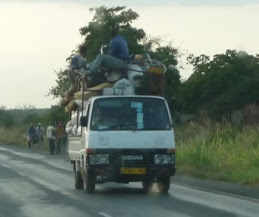





























































































































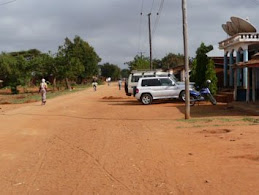

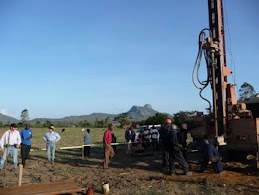


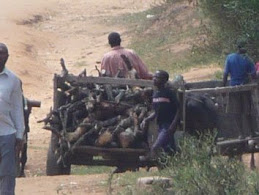
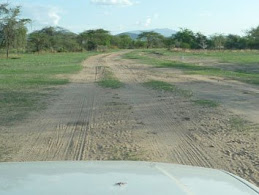























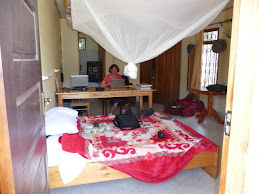

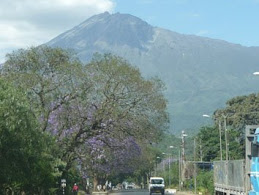
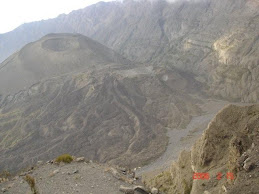
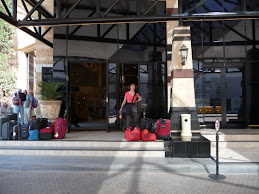
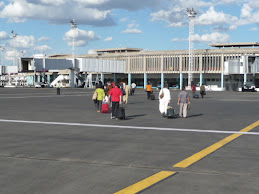
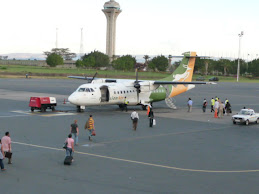
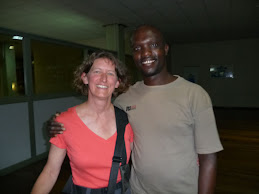
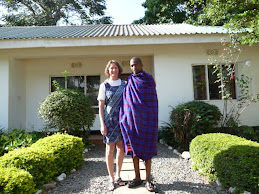
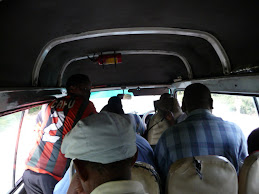


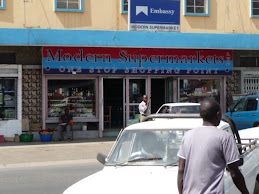





No comments:
Post a Comment